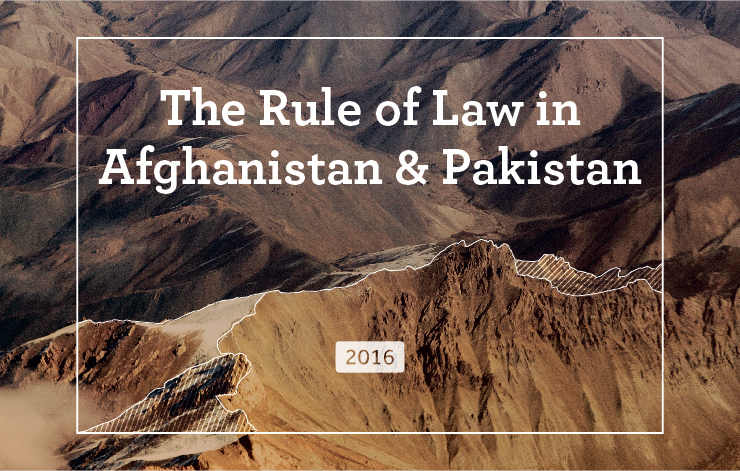
 The World Justice Project (WJP) is pleased to announce the release of two new reports: The Rule of Law in Afghanistan and The Rule of Law in Pakistan.
The World Justice Project (WJP) is pleased to announce the release of two new reports: The Rule of Law in Afghanistan and The Rule of Law in Pakistan.
Representing the voices of over 10,000 people, the reports present findings from two nationally-representative surveys conducted in Afghanistan and two World Justice Project surveys conducted in five urban centers in Pakistan from May to September 2016. The first survey is WJP’s General Population Poll conducted for the WJP Rule of Law Index®, which captures data on the general public’s experiences and perceptions related to government accountability, bribery and corruption, crime, and access to justice.
The second survey, the Justice Sector Survey, captures data in greater depth on respondents’ views and experiences related to dispute resolution, legal awareness, legal identity, household dynamics, and gender issues.
Whereas the WJP’s flagship WJP Rule of Law Index® offers aggregate rule of law scores, the two new reports present disaggregated question-level data as a series of thematic briefs to highlight different facets of the rule of law as it is experienced by ordinary citizens in Afghanistan and Pakistan. These briefs touch upon issues of accountability, corruption, fundamental rights, access to information, crime, justice – criminal, civil, and informal – as well as the role of women in society.
About the Surveys
- The General Population Poll in Afghanistan was conducted through face-to-face interviews in 3,550 urban and rural households distributed proportionally across the 34 provinces of Afghanistan in August 2016. The Afghanistan Justice Sector Survey was conducted through face-to-face interviews in 3,087 urban and rural households distributed proportionally across the 34 provinces of Afghanistan in July and August 2016.
- To complement the quantitative findings of the Afghanistan Justice Sector Survey, The Rule of Law in Afghanistan also includes a summary of the most salient findings from 50 in-depth interviews, designed to gather qualitative data about Afghans’ views on justice in their community, the dispute resolution process, and how it affects their personal lives.
- The General Population Poll in Pakistan was conducted in August and September 2016 through face-to-face interviews in 2,100 urban households distributed proportionally across the five urban areas of Faisalabad, Karachi, Lahore, Peshawar, and Quetta. The Pakistan Justice Sector Survey was conducted in May and June 2016 through face-to-face interviews in 2,000 urban households distributed proportionally across the five urban areas of Faisalabad, Karachi, Lahore, Peshawar, and Quetta.
Key Findings from Afghanistan:
- Perceptions of Government Accountability: There is a high perception of impunity in Afghanistan, though perceptions of government accountability vary across regions. Compared to peer countries in South Asia, perceptions of accountability in Afghanistan are better than in Pakistan and India, but worse than in Nepal, Bangladesh, and Sri Lanka.
- Dispute Resolution: Nearly two thirds of Afghans experienced a dispute in the last 12 months, with family disputes, water disputes, land disputes, assault, and neighbor disputes being the five most common dispute types. Among Afghans that reported experiencing a dispute, less than half took any action to resolve their dispute. Of those that did take action, most chose to take their dispute to an informal mechanism for resolution.
- Trust in Afghanistan: Afghans have a high degree of trust in fellow citizens. Across institutions, Afghans have the most trust in the police and the least trust in the courts. Since 2013, there has been a moderate decline in respondents’ reported level of trust in the police, local government officers, national government officers, and in the courts.
Key Findings from Pakistan:
- Bribery Victimization: Petty bribery is pervasive in Pakistan. Approximately three quarters of Pakistanis have paid a bribe to process a government permit and to receive assistance from the police.
- Fundamental Freedoms: Since 2013, there has been a decline in Pakistanis’ perceptions of political, media, and religious freedoms in the country. Despite these declines, Pakistanis’ views of their freedoms are average compared to perceptions in other South Asian countries.
- Women in Pakistani Society: There are minor differences in men and women’s views regarding the rights of women when it comes to inheritance and divorce, but the perception gap grows for questions related to women’s role in the community and household dynamics.
The reports are now available for download at the World Justice Project website.






